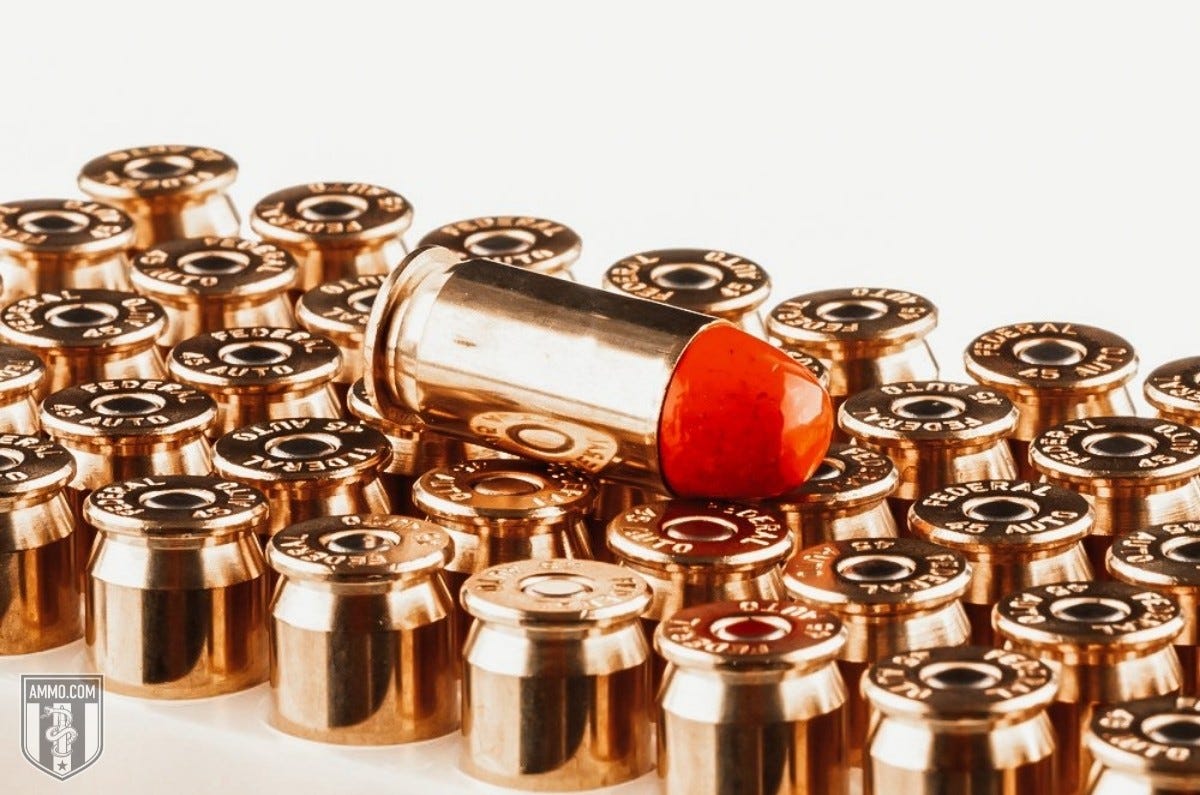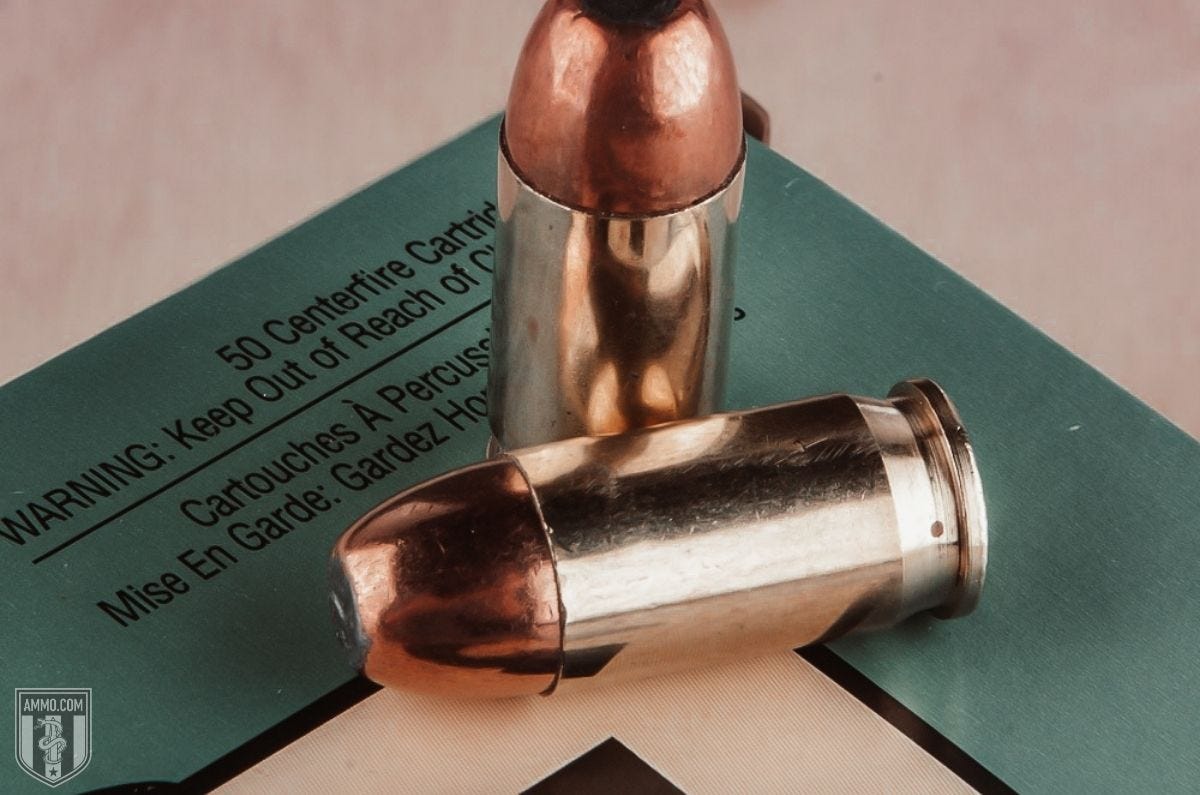Best Cartridge for Self-Defense: Protecting Yourself and Your Loved Ones
The best cartridge for self-defense balances power, penetration, capacity, and concealability in an easy-to-shoot package. Here are our top picks.
The debate over which pistol caliber is best for self-defense has been raging for decades. Gun owners are typically passionate about their choices and the argument often turns ugly.
This article probably won’t put a stop to the “best caliber for self-defense” bickering. However, by looking at the stats and data for the most popular defensive cartridges in current production, we can help you make an informed decision about what will work best for you.
This article will also offer some sound science you can use when you find yourself embroiled in a hot dispute over your favorite self-defense cartridge.
Choosing the Best Caliber for Self-Defense
Deciding on a self-defense cartridge is a highly personal decision. There is no perfect one-size-fits-all best self-defense caliber. What works well for one shooter might be an absolute nightmare for another.
To gain advantages in one area (like terminal energy), you’re going to need to make concessions in others (like recoil energy). Finding the right cartridge for defensive needs is all about finding a balance between what you can shoot, what you can comfortably carry, and what has enough power to make short order of a dangerous threat.
Here is a list of the most popular options modern shooters use for defensive carry. Each has its pros and cons.
Looking at the data and using our personal experiences, we’re convinced that the 9mm Luger is the best all-around handgun cartridge for self-defense.
However, smaller shooters often find 9mm pistols difficult to shoot and even harder to conceal. We’ve chosen the 9mm because it works well for the vast majority of shooters in most defensive applications.
9mm Luger - Our Top Pick
9mm Luger (also called 9x19 Parabellum or simply 9mm) was once considered a subpar option for personal defense. Times have changed. Today, the 9mm is the most popular cartridge for both law enforcement and civilian concealed carry, and it earned that popularity fair and square.
Recoil
As Sir Isaac Newton so eloquently put it in his Third Law of Motion, “For every action, there is an equal and opposite reaction.”
In the world of shooting, the opposite reaction to firing a projectile is recoil. Recoil is the amount of “kick” a firearm produces when a bullet is fired. Guns that produce less recoil are generally easier to shoot.
Firearms with extreme recoil can be brutal to shoot, which causes issues with accuracy, especially on follow-up shots.
Compared to larger caliber defense rounds, the 9mm produces relatively mild recoil. Because the 9mm’s recoil is easier to tame, shooters can make faster, more accurate follow-up shots. Since your life depends on good shot placement in a defensive shooting scenario, this is a major selling point for 9mm.
The subject of recoil isn’t always cut and dry. For example, a micro 9mm will be tougher to control than a full-size .45 ACP.
Power and Penetration
When it comes to “stopping power,” 9mm is very ammo specific. Modern advancements in ammo technology have brought the terminal performance of the 9mm up to par with much larger caliber cartridges. Today’s 9mm ammo shoots faster, hits harder, and expands larger than the 9mm ammo we were shooting just a decade ago.
However, when it comes to personal protection, some 9mm loads work better than others. For best results, choose expanding hollow points for your self-defense handgun.
Capacity
Although actual capacity varies by model, 9mm offers greater capacity than most other popular concealed carry calibers. Because 9mm cartridges are smaller than .40 S&W or .45 ACP, they don’t take up as much space in a magazine, which allows for greater round capacity.
Cost and Availability
9mm Luger ammo is pretty affordable compared to other popular pistol calibers. That means you won’t need to drop a ton of cash on your carry ammo.
Because practice loads are relatively cheap, you can hone your skills without hurting your bank account. Since weapon proficiency is a necessary component of defensive shooting, this is another major perk for 9mm.
The 9mm Luger is one of the most popular cartridges on the market today. There is no shortage of 9mm pistols or ammo to choose from. Every major manufacturer offers multiple gun models, with everything from autoloaders to revolvers, subcompact to full size. There are also hundreds of defense-specific loads for shooters to choose from.
.380 ACP
The .380 Automatic Colt Pistol (also called .380 Auto and .380 ACP) was introduced in 1908. It was designed for the blowback pistols of the time. Compared to more modern pistol cartridges, the .380 ACP lacks the power, speed, and terminal performance to make it a serious option for personal protection or home defense.
So why is it included on this list?
When you need it, even a small gun like the .380 ACP is better than no gun at all.
We believe the .380 Auto works best as a backup gun rather than a primary concealed carry weapon. Their ultra-compact size and easy concealability make them perfect for that role.
Get a quality pocket or ankle holster, and a.380 ACP makes a great sidekick for your EDC sidearm.
Recoil
Although .380 ACP and 9mm Luger use the same diameter projectiles, .380 pushes lighter bullets at slower speeds. While the .380 ACP may be lacking in velocity, those slower speeds mean less recoil energy.
Recoil is affected by a ton of variables. One of the most significant is gun weight. Heavier guns soak up more recoil than lighter ones. Although the .380 ACP produces less recoil energy than any of the other cartridges on this list, these cartridges run through tiny, lightweight pistols. Lightweight pistols don’t absorb much recoil energy, so most of it transfers to the shooter.
When shooting the tiniest .380 Auto micro pistols, you might feel more recoil than when you’re shooting a compact 9mm. For example, a 95-grain projectile leaving the muzzle of a .6-pound .380 Auto pistol at 900 fps generates 5.4 foot-pounds of recoil energy. A 115-grain bullet traveling 1150 fps from the barrel of a pound-and-a-half 9mm produces 5.2 foot-pounds of recoil. Not much difference.
Add a little more heft to the gun and the 9mm gets even easier to shoot. When shot from a two-pound pistol, that same 9mm bullet only kicks 3.8 foot pounds. That’s significantly less recoil than the .380.
Power and Penetration
The .380 Auto and the 9mm Luger use the same size projectiles. However, the .380 ACP cartridge has an overall length of .984 inches and a SAAMI maximum pressure of 21,500 psi. In comparison, the 9mm measures 1.169 inches and has a maximum pressure of 35,000 psi.
Because both cartridges use the same diameter bullets, depth is the main difference in the wound channels they produce.
The Federal Bureau of Investigation uses specific penetration test protocols to determine the effectiveness of defensive loads. According to FBI performance standards, a bullet should penetrate at least 12 inches into ballistics gel, but no more than 18 inches.
Meeting those protocols is difficult for .380 ACP with expanding bullets because a good portion of the penetrating energy is used up during expansion. Penetration can be much shallower if those bullets pass through heavy clothing first.
While non-expanding FMJs have an easier time reaching the magic 12-inch depth, the wounds they carve are not as wide. Since fractions of an inch matter when it comes to organ and artery damage, using a non-expanding bullet sacrifices terminal damage. Simply put: bigger holes stop assailants faster than small ones.
Capacity
Tiny backup pistols don’t need to carry a bunch of ammo. The Glock subcompact G42, which is chambered in .380 Auto, has a standard magazine capacity of only six rounds.
Although you can purchase, 15-round magazines, it makes the pistols much more difficult to conceal.
Cost and Availability
Micro pistols designed for James Bond-style deep concealment are all the rage right now. That means there is a wide variety of .380 ACP pistols on the market.
Unfortunately, there isn’t nearly as much variety in the ammo department. Although most major manufacturers have several .380 ACP loads in their line-ups, there isn’t nearly the selection that you’ll find for more popular loads like 9mm or .45 ACP.
The ammo you do find will also cost you. Most .380 ACP loads are significantly more expensive than 9mm. Cost-wise, they are more on par with hefty hitters like .45 ACP.
Continue reading about the best cartridges for self-defense here.






